Iran Releases 8,000 Impounded Vehicles Seized for Hijab Violations
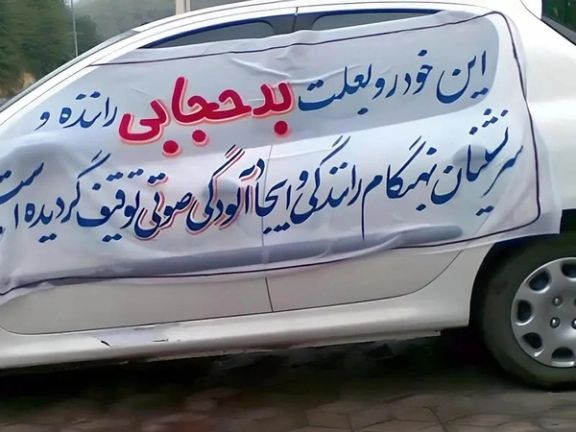
Iran’s Police Information Center announced on Saturday that 8,000 vehicles, previously impounded due to hijab law violations, have been released.

Iran’s Police Information Center announced on Saturday that 8,000 vehicles, previously impounded due to hijab law violations, have been released.
The release of the vehicles comes in the wake of the third televised debate among Iran’s six presidential candidates, where "cultural issues," including the country’s mandatory hijab laws, took center stage.
During the debate, some candidates addressed the hijab law directly, with conservative candidate Pourmohammadi pledging to withdraw the hijab bill if elected. However, the ultimate decision-making power remains with Supreme Leader Ali Khamenei, a staunch proponent of the hijab mandate.
Iran’s recent intensified hijab crackdowns were initiated following Plan Nour, a directive by Supreme Leader Khamenei on April 13, as part of Iran’s Hijab and Chastity bill. It led to the arrest of hundreds of women across various cities in Iran and was dubbed "gender apartheid" by the United Nations.
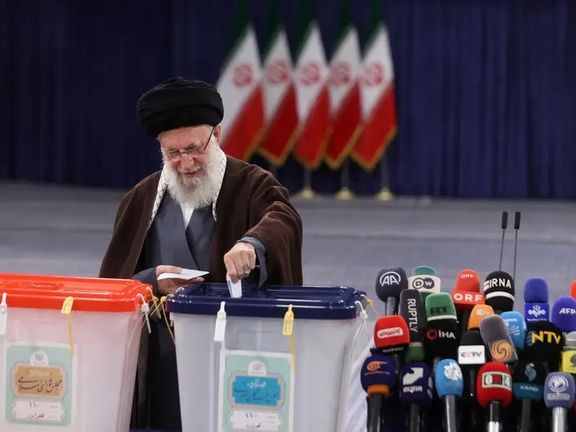
As the Islamic Republic faces its greatest battle for legitimacy since its founding, a new survey shows at least 65 percent of the country will boycott the upcoming presidential elections.
According to the survey conducted by the Netherlands-based Gamaan Institute, only 22% of respondents confirmed they would definitely vote, while 12% remain undecided.
Titled "Iranians’ Attitudes Toward the 2024 Elections," the survey was conducted online over three days from June 17 to 19, 2024, with a sample of 77,216. However, in the past three days the election campaign might have somewhat impacted voters' mood in favor of participation.
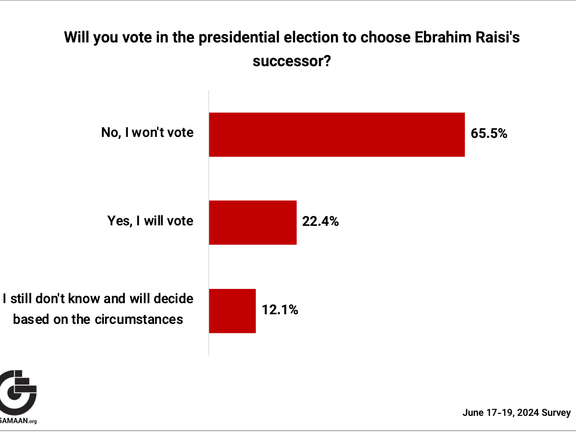
Additionally, approximately 34% of the population reported being unaware of the date of the snap election on June 28 in the wake of the sudden death of former President Ebrahim Raisi. He died last month in a helicopter crash along with several officials.
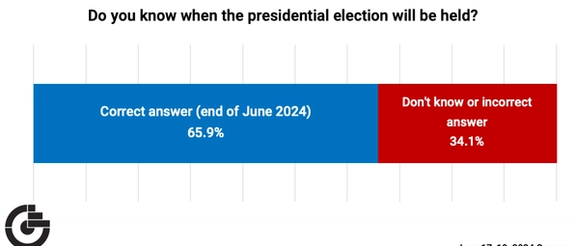
The results of the survey highlight deep-seated dissatisfaction with the current political system, with roughly 68% of respondents citing "opposition to the overall system of the Islamic Republic" as their primary reason for not voting. Other notable reasons included "the limited power of the president" (18%) and the "disqualification of my preferred candidate" (8%).
Iran International cannot independently verify the accuracy of the survey since polling with traditional methods is not possible within Iran.
However, in February this year, Gamaan’s survey revealed that three-quarters of Iranians will boycott the upcoming parliamentary elections, with 75% seeking the overthrow of the government. The prediction of that survey came out to be largely true, with the government claiming a 40% turnout.

The survey also touched on public perceptions surrounding the helicopter crash which killed Raisi, with 51% of respondents attributing it to "power struggles within the regime," while 13% believing it was due to natural factors, and 6% suspecting sabotage by foreign countries.
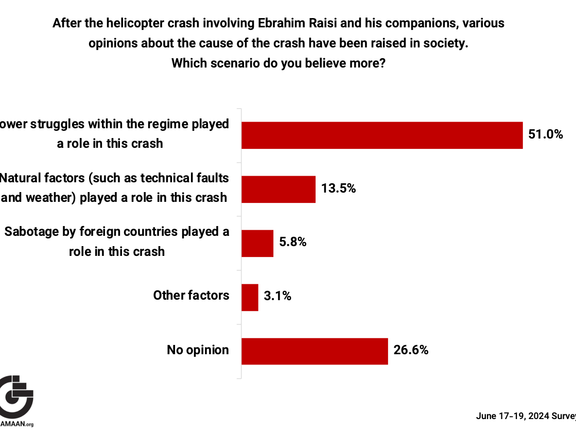
The findings reflect the general mood in the country amid economic and social turmoil. Iran has been suffering from more than 40% annual inflation for the past four years, and unprecedented government violence against those who have dared to protest since 2019.
In recent days, political and civil figures, women activists, and civil organizations, have called for boycotting the elections. More than 500 teachers, union activists, and prominent cultural figures in Iran publicly announced their decision to abstain from voting in the upcoming presidential elections through a joint statement.
From the confines of Evin prison, Iranian Nobel laureate Narges Mohammadi denounced the presidential election in Iran, calling it the "illegal elections of the oppressive and illegitimate government”.
Similarly, political prisoner Mahboubeh Rezaei slammed the elections explaining that “the Islamic Republic has no legitimacy" after almost two years of the Woman, Life, Freedom uprising has left the government in crisis.
Dozens of citizens also said in messages to Iran International that they would not participate in the elections.
On Saturday, it was reported that the US will allow remote voting stations for Iranians abroad. Iranian Americans strongly criticized the decision saying that it only bolsters the facade of legitimacy for the regime.
With the world's largest diaspora of Iranians abroad, there will be over 30 stations in the US which last year labeled Iran the world's number one state sponsor of terror.
Ballot boxes will be set up at the Iranian Interests Section of the Pakistani embassy in Washington and in New York among others.
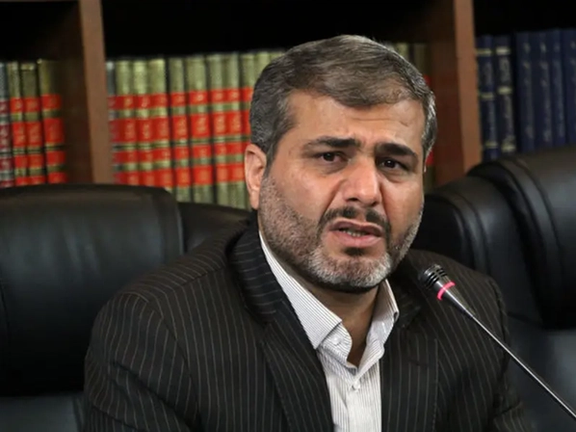
Tehran's judiciary chief Ali Alghasi-Mehr announced that the Criminal Court of Tehran has sentenced the US government and officials to pay a total of $9 billion over the targeted killing of Ghasem Soleimani and sanctions against the Islamic Republic.
Alghasi-Mehr alsos aid that 73 US officials were notified to announce legal representation for the court proceedings concerning the case of IRGC Quds Force commander Qassem Soleimani.
On January 3, 2020, President Donald Trump ordered a drone strike near Baghdad International Airport that resulted in the death of Soleimani. The US justified the action by claiming Soleimani was actively planning attacks against American diplomats and military personnel in Iraq and the broader region.
Last year, Iran's judiciary said it has identified 97 suspects in the killing of Soleimani, including former US President, Donald Trump.Mohammad Mosaddegh, Deputy Chief of Iran's Judiciary, announced on Wednesday that "legal measures have been initiated against 73 Americans" including Trump and former secretary of state, Mike Pompeo.
Soleimani, who held a prominent role in Iran's military and intelligence operations abroad, oversaw the support and coordination of various militant proxy groups, including Lebanon's Hezbollah and Shiite militias in Iraq, which frequently targeted US forces.
Starting in January 2021, Tehran openly indicated its readiness to carry out deadly missions within the United States to seek revenge for the killing. It consistently singled out Trump, Pompeo, and former CENTCOM Commander General Kenneth McKenzie as top-priority targets for potential retaliation.
In 2022, late President Ebrahim Raisi told the UN that Donald Trump should face trial for his role in the Soleimani killing, and this year, continues to call for "vengeance" to the military man's killers.
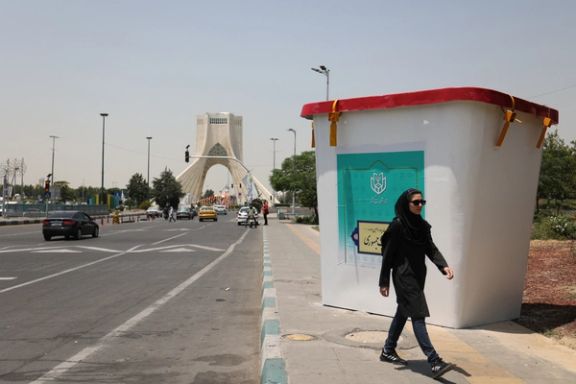
Many Iranians are still deliberating whether to boycott the "neither fair nor free" elections or to vote. The only candidate with the potential to sway some of these voters appears to be the pro-reform Masoud Pezeshkian.
Pezeshkian’s chance of being elected as the Islamic Republic’s next president largely depends on a high voter turnout. However, predicting public sentiment for the June 28 election is challenging due to the lack of reliable and independent surveys. So far, there is little evidence on social media or from reports inside Iran to suggest a shift in the public’s generally indifferent attitude toward the elections.
Three government agencies – the intelligence and interior ministries and the state broadcaster (IRIB) – conducted separate surveys in all previous elections. Results were not publicly announced but were often leaked to the media which referred to them only as “poll by a reliable state agency”.
In these elections, however, poll results are being tightly guarded, likely to prevent evidence of a possible low turnout from reaching the public. Authorities have also warned about unofficial online polls, labeling them as “falsified,” and have arrested at least twenty people for conducting such polls.
At this stage, former nuclear negotiator Saeed Jalili and newly re-elected speaker of the parliament, Mohammad-Bagher Ghalibaf, both of whom are hardliners, appear to be the strongest contenders with Pezeshkian closely following them in most unofficial, online polls.
Pezeshkian supporters in Sanandaj
Pundits say Pezeshkian has a chance of winning against his rivals if both hardliners remain in the race and around 60 percent of eligible voters go to the polls. Jalili and Ghalibaf have both insisted that neither will withdraw in favor of the other.
The chances that the three other candidates -- hardliners Alireza Zakani and Amir-Hossein Ghazizadeh, and conservative Mostafa Pourmohammadi – make a significant difference in the outcome of the elections is too small unless they withdraw in someone else’s favor, pundits say.
Pezeshkian, an independent politician with views close to reformists, is being supported by the Reforms Front and some moderate conservatives, including former Foreign Minister Mohammad-Javad Zarif. In the three highly controlled debates aired by the state television so far, Pezeshkian has presented a rather conservative image.
Zarif announced his support for Pezeshkian on June 17 and accompanied him to the second televised debate of the candidates where he delivered a fiery speech. Zarif’s support could increase Pezeshkian’s popularity among some of the voters but also has the potential to damage his position among other groups of the Iranian society.
Since then, he has actively promoted Pezeshkian on social media, Club House discussions and campaign meetings. Zarif also traveled to Kashan in central Iran on Friday where ultra-hardliners tried to disrupt his speech.
Pezeshkian supporters in Shiraz
In the past few days Pezeshkian’s popularity appears to have increased on social media. Google Trends also suggests he has been looked up more than the other candidates by more people since the first televised debate.
On Saturday, Pezeshkian received a rather warm welcome in Sanandaj, the capital of Iran's Kordestan Province, and then in Shiraz, the capital of Fars Province. Thousands also gathered for his speech in Ahvaz, the capital of the oil-rich but poverty-stricken province of Khuzestan, in the evening of the same day.
In Shiraz, thousands of supporters filled the stadium where he spoke, reiterating his promises to fight for social freedoms and try to solve the problem of crippling sanctions and corruption.
These, some Iranian social media users say, are only empty promises because they believe it is Supreme Leader Ali Khamenei who has the final say in all matters of importance and there are other centers of power, including a hardline dominated parliament and the Revolutionary Guards (IRGC), that can sabotage Pezeshkian’s efforts as they did when Hassan Rouhani was president.
Pezeshkian supporters in Ahvaz waiting for his arrival outside a packed hall
Those in favor of boycotting elections also argue that voting for Pezeshkian, whether he merits being chosen president or not, is tantamount to acknowledging the legitimacy of the Islamic Republic and its elections that they believe are “engineered”.
Others say he is not so different from the other candidates and politicians because throughout his campaign he has insisted in his speeches and election debates that if elected, he will not introduce any new economic plans and only carry out the existing ones that have been “approved” by Khamenei.
Critics also say Pezeshkian, 70, is out of touch with the younger generation who were the driving force of the anti-government protests of 2022-23.
Pezeshkian appears to be betting on the votes of ethnic groups and the Sunni minority who are mainly Kurdish, Turkmen and Baluchi speakers.
He has advocated the teaching of Turki, the Turkic dialect spoken in Iran's East and West Azarbaijan provinces, as well as other ethnic languages such as Kurdish in schools and says he will champion the rights of all ethnic groups and the Sunni minority.
Pezeshkian was born to a Kurdish mother and Azari father in the Kurdish city of Mahabad and is fluent in Turki and Kurdish languages. Some of Pezeshkian’s campaign posters have been printed in these two languages and he delivered part of his speech in Sanandaj Saturday in Kurdish.
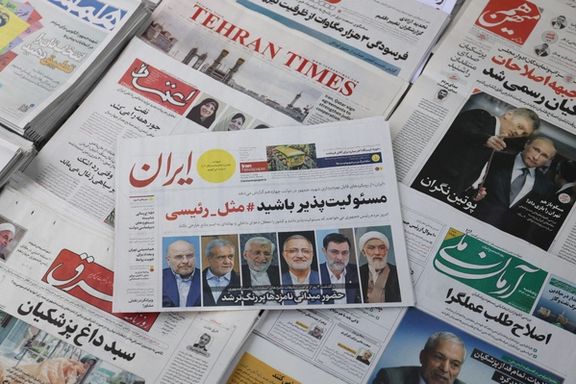
An Iranian newspaper has denounced the arrest of four journalists during the presidential election campaign, suggesting that it was orchestrated by "one conservative candidate," further dampening public interest in voting.
In an article published on Saturday, the newspaper singled out Parliament Speaker and presidential candidate Mohammad Bagher Ghalibaf, detailing how three of the arrested whistleblowers were directly involved in exposing cases pertinent to him.
Experts interviewed by Ham-Mihan daily in Tehran opine that these measures, seemingly intended to silence whistleblowers and bolster Ghalibaf's candidacy, have ironically backfired, as the whistleblowers are well-known figures, making the actions appear more like attempts to suppress dissent.
“In recent years, these detained journalists have disclosed information concerning one of the candidates, which appears to hold validity. In addition, they were arrested during the election period. As a result, it has fueled speculation that the arrests were orchestrated to benefit one of the primary fundamentalist candidates in the elections,” Kambiz Nowrouzi, a lawyer, told Ham-Mihan.
“In my view, this action serves neither the interests of the Judiciary nor those of the candidate they aim to help. Instead, it exacerbates the crisis, prompting questions about why punitive measures are being taken now rather than earlier,” Iranian journalist and political activist Abbas Abdi told Ham-Mihan.
"The failure to address [whistleblowers'] revelations could precipitate a crisis that akin to a last-minute blow significantly undermines the electoral atmosphere," Abdi said.
Meanwhile, Ghalibaf has denied the allegations, explaining in an interview, "These cases have been through various courts, with private plaintiffs involved. I did not personally file complaints against the media."
The individuals detained include journalists and whistleblowers Vahid Ashtari, Yashar Soltani, Saba Azarpeik, and Hadi Kasaeizadeh.
Security forces arrested social media activist and whistleblower Vahid Ashtari to begin serving his jail term shortly after the release of documents implicating Galibaf on Thursday. Ashtari has publicly exposed corruption allegations against Ghalibaf and his associates. In April 2022, Ashtari’s revelations triggered the Layette-gate scandal, prompting calls for Ghalibaf’s resignation and renewed scrutiny of alleged corruption involving his family.
Earlier this month, the judiciary detained journalists and whistleblowers Saba Azarpeik and Yashar Soltani to serve pending sentences.
In 2016, Memari News, led by prominent whistleblower Yashar Soltani, reported that Lavizan Park in Tehran had been closed for several days to host the wedding celebration of Ghalibaf's daughter while he served as mayor. The report detailed how municipal resources were used, including illuminating the park at the expense of local authorities in Tehran's fourth district.
In 2019, Soltani was incarcerated for uncovering financial irregularities within the Tehran Municipality during Ghalibaf's tenure and for disclosing information about the wedding.
The husband of imprisoned journalist Saba Azarpeik alleges that conservative politician Ghalibaf, along with former MP Mohsen Dehnavi, initiated legal action against her.
Hadi Kasaeizadeh, editor-in-chief of Meydan-e Azadi Monthly, was arrested on Friday. He had been accused of “disclosure of particulars surrounding Nika Shakrami's death, a 16-year-old murdered by the Iranian security forces in 2022 amid nationwide protests.
“While the frequent occurrence of journalist arrests has become commonplace in the country's news cycle in recent years, the timing of such arrests on the eve of the presidential election casts a somber shadow over the forthcoming event. It can potentially stir up suspicions and rumors that specific election candidates may be attempting to conceal information or suppress dissenting voices,” Ham-Mihan wrote.
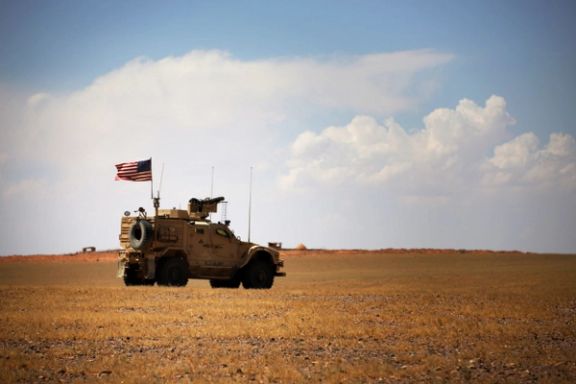
A drone aiming for a US military base in Syria's Al-Tanf was intercepted and destroyed on Saturday, months after Iran-backed militants suspended such attacks following the deaths of three US troopers in an attack on a nearby base.
The Al-Tanf base, located within a 55-kilometer exclusion zone at the convergence of the Syrian, Jordanian, and Iraqi borders, engaged its air defenses after the drone ventured in from the east, the Syrian Observatory for Human Rights reported on Saturday.
The incident occurred less than 24 hours after airstrikes that hit an Iranian-backed militia in the Al Bukamal area near the Syrian-Iraqi border, reportedly killing one and injuring two militants.
While no group has claimed responsibility for the drone attack on the US base, such assaults are typically claimed by the Islamic Resistance in Iraq, a coalition of Tehran-backed militants.
The ongoing strikes underscore the escalating tension between US forces and Iranian-supported groups in the region.
The groups have been criticized for their recklessness, which led to a regional flare-up in January when a drone strike by the Islamic Resistance in Iraq killed three US troops in a US base in Jordan, close to the one in Al-Tanf.
The breach of several regional and US red lines prompted a response involving a series of US airstrikes across Iraq and Syria.
The risk of escalation became so serious that the commander of Iran's elite Quds Force made a trip to Baghdad to instruct the factions to reduce their attacks, according to Iranian and Iraqi sources who spoke to Reuters.
Following the intervention, there was a temporary cessation of attacks on US forces. However, after a brief period of calm, the focus of the attacks shifted towards Israel.